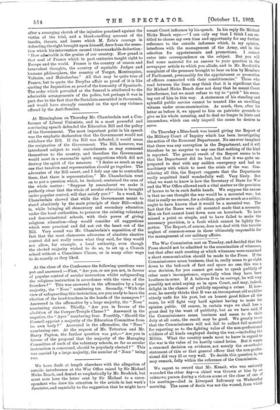At Birmingham on Thursday Mr. Chamberlain met a Con- ference
of Liberal Unionists, and in a most powerful and convincing speech defended the Education Bill and the policy of the Government. The most important point in his speech was the emphatic declaration that the Government would not withdraw the Bill. If the Bill was defeated, it would mean the resignation of the Government. The Bill, however, was introduced subject to such amendments as may commend themselves to the country, and therefore the Government would meet in a reasonable spirit suggestions which did not destroy the spirit of the measure. "I desire as much as any one that taxation and representation should go together. The advocates of the Bill assert, and I defy any one to contradict them, that there is representation." Mr. Chamberlain went on to put a question which, he declared, contained the crux of the whole matter : "Suppose by amendment we make it perfectly clear that the whole of secular education is brought under popular control, will that satisfy you ? " In a word, Mr. Chamberlain showed that while the Government meant to stand absolutely by the main principle of their Bill—which is, while bringing all elementary and secondary education under the local authorities, to preserve the existing voluntary and denominational schools, with their power of giving religious education—they would consider all suggestions which were practical and did not cut the heart out of the Bill. Very sound was Mr. Chamberlain's exposition of the fact that the most clamorous advocates of absolute elective control did not really mean what they said, for they would not allow, for example, a local authority, even though the elected majority wished to do so, to set up a Church school without a Conscience Clause, or in many other ways to do exactly as they liked.










































 Previous page
Previous page